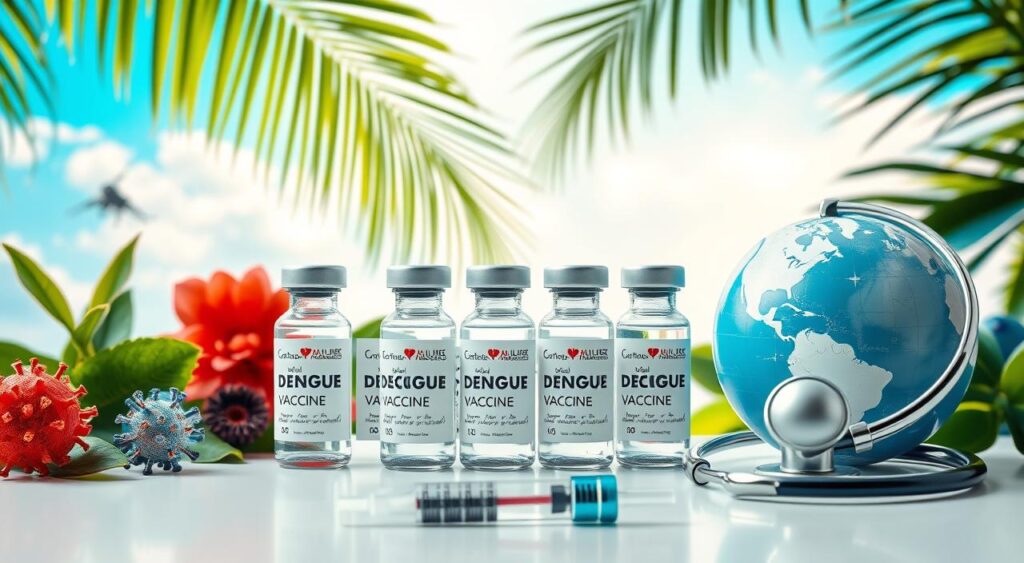Every year, 390 million people get dengue fever, making it a big health issue globally. Finding good dengue treatment is key to lowering sickness and death rates. Treatment aims to ease symptoms, stop serious problems, and help the body heal.

Dengue treatment has different methods, and knowing them is important. The main goal is to ease symptoms and avoid serious issues. By learning about these treatments, people can choose the best care for themselves.
Key Takeaways
- Understanding dengue fever treatment options is crucial for effective management of the disease.
- Dengue treatment focuses on managing symptoms and preventing complications.
- Effective dengue fever treatment can reduce morbidity and mortality.
- Dengue treatment options vary, and it is essential to understand the different approaches.
- Individuals can make informed decisions about their care by understanding the available dengue treatment options.
- Dengue fever treatment is a significant concern worldwide, with 390 million people infected every year.
Understanding Dengue Fever and Its Impact
Dengue fever is a big health problem, affecting millions globally. To fight it, we need to know a lot about dengue virus treatment and understanding dengue fever. This includes its causes, how it spreads, and its effects worldwide.
The disease comes from one of four dengue virus types. It mainly spreads through bites from infected Aedes mosquitoes. Knowing this helps us stop it and find good dengue virus treatment options.
What Causes Dengue Fever
Dengue fever is a viral illness spread by mosquitoes. Many things affect how it spreads, like the weather, cities growing, and how people act.
How Dengue Spreads
The main way it spreads is through mosquito bites. But, it can also spread through blood transfusions and organ donations.
Global Impact and Statistics
Dengue fever has a big impact worldwide. The World Health Organization (WHO) says half of the world’s people could get it. This shows we really need good dengue virus treatment and ways to stop it.
Recognizing Dengue Symptoms
It’s important to know the dengue symptoms early. This helps in getting the right treatment fast. Dengue fever symptoms start 3 to 14 days after a mosquito bite. They can be mild or very severe.
Common dengue symptoms include:
- High fever
- Severe headache
- Pain behind the eyes
- Joint and muscle pain
- Rash
- Mild bleeding
In serious cases, dengue symptoms can cause big problems. These include bleeding, low blood platelets, and blood plasma leakage. These can be very dangerous. It’s key to spot these signs and get help right away.
Knowing the common dengue symptoms helps you act fast. This can stop the disease from getting worse. It also lowers the chance of serious problems.
| Symptom | Description |
|---|---|
| High Fever | A high temperature, usually above 104°F (40°C) |
| Severe Headache | A severe and persistent headache |
| Pain behind the eyes | Pain and discomfort behind the eyes |
Dengue Diagnosis Process
The dengue diagnosis process combines clinical evaluation, lab tests, and differential diagnosis. It starts with a detailed medical history and physical exam. These steps are key in the initial assessment.
Lab tests like the complete blood count (CBC) check for low platelet counts. Blood tests look for the dengue virus or its antibodies. Here are the main steps in diagnosing dengue:
- Initial medical assessment: A thorough medical history and physical examination are conducted to identify symptoms and risk factors.
- Laboratory tests: Tests such as CBC and blood tests are used to detect the dengue virus or its antibodies.
- Differential diagnosis: This is done to rule out other diseases that may present with similar symptoms, such as malaria, typhoid fever, and leptospirosis.
Understanding the dengue diagnosis process is vital. It helps healthcare providers make informed decisions. This ensures patients get the best care possible.
Importance of Accurate Diagnosis
Accurate diagnosis is crucial in managing dengue fever. It allows healthcare providers to create effective treatment plans. This can reduce complications and improve patient outcomes.
| Test | Purpose |
|---|---|
| Complete Blood Count (CBC) | To check for low platelet count |
| Blood tests | To detect the dengue virus or its antibodies |
Medical Dengue Treatment Options
Medical treatments for dengue focus on easing symptoms. There’s no special medicine for it. For mild cases, rest, hydration, and watching symptoms at home are key.
Those with severe symptoms need hospital care. Dengue medication includes acetaminophen for fever and pain. Sometimes, intravenous fluids and electrolytes are used to handle dehydration and imbalances.
Hospital-Based Care
Hospital care is vital for severe dengue. It involves watching the patient closely. It also manages dehydration and prevents complications.
Medication Protocols
Here are the main dengue treatment medicines:
- Acetaminophen to reduce fever and pain
- Intravenous fluids and electrolytes to manage dehydration and electrolyte imbalances
Monitoring and Management
Monitoring and managing symptoms are key. This helps avoid complications. It includes regular doctor visits, checking vital signs, and managing other health issues.
Knowing about dengue treatment helps patients get the care they need. Working with a healthcare provider is crucial. It helps prevent complications and ensures the best treatment plan.
| Treatment Option | Description |
|---|---|
| Rest and Hydration | Managing symptoms at home with rest, hydration, and monitoring |
| Hospital-Based Care | Close monitoring and management of severe symptoms |
| Medication Protocols | Use of acetaminophen and intravenous fluids and electrolytes |
Supportive Care and Home Management
For patients with mild dengue fever, supportive care is key. It means lots of rest, staying hydrated, and watching for severe signs. Avoiding aspirin and ibuprofen is also important to prevent bleeding.
Good home management means checking temperature, blood pressure, and overall health often. If symptoms get worse or severe dengue signs appear, seek medical help right away. Important parts of care and management include:
- Drinking lots of fluids, like water, clear broths, or electrolyte-rich drinks
- Resting well to help the body heal
- Checking temperature, blood pressure, and health regularly
- Staying away from medications that can cause bleeding
By following these steps, patients can get the right supportive care and home management to recover from dengue fever.
Proper supportive care and home management can significantly improve the chances of a full recovery from dengue fever.
| Aspect of Care | Importance |
|---|---|
| Rest | Helps the body recover |
| Hydration | Replaces lost fluids and electrolytes |
| Monitoring | Helps identify signs of severe disease |
Natural Remedies for Dengue Recovery
Medical treatment is key for dengue fever. But, some natural remedies for dengue can help too. Herbal supplements like papaya leaf extract might boost platelet count. Yet, their safety and effectiveness vary by person.
Eating foods full of vitamins, minerals, and antioxidants is good for your immune system. Traditional medicine approaches, like Ayurveda and traditional Chinese medicine, have their own remedies. But, always talk to a doctor before trying these to make sure they’re safe and work well.
Here are some natural remedies for dengue:
- Drink lots of fluids to stay hydrated
- Eat foods rich in nutrients to boost your immune system
- Rest well to help your body heal

Remember, while traditional medicine approaches can be beneficial, they shouldn’t replace medical care. Always check with a healthcare professional before trying any alternative treatments.
| Remedy | Description |
|---|---|
| Papaya Leaf Extract | May help increase platelet count |
| Ayurveda | Offers various remedies to support the immune system |
| Traditional Chinese Medicine | Provides alternative therapies to complement recovery |
Dengue Prevention Strategies
To prevent dengue fever, we need to avoid mosquito bites and get rid of places where mosquitoes breed. Dengue prevention strategies mean we take steps to lower our risk of getting sick. Here are some ways to prevent dengue:
- Using insect repellents and wearing protective clothing
- Staying in air-conditioned or well-screened areas
- Eliminating standing water around homes and communities to prevent mosquito breeding
By using these dengue prevention strategies, we can lower our chances of getting dengue. It’s important to be proactive because dengue can be very serious if not treated.
Also, using things like window screens and bed nets can help protect us from mosquitoes. By taking a full approach to dengue prevention strategies, we can help fight this disease.
| Prevention Method | Effectiveness |
|---|---|
| Using insect repellents | High |
| Wearing protective clothing | Medium |
| Eliminating standing water | High |
Understanding Dengue Vaccine Options
Dengue fever affects millions globally, making effective vaccines crucial. In recent years, dengue vaccine options have grown. This gives people a chance to fight this serious illness.
The Dengvaxia vaccine is the main option available. It’s for those aged 9 to 45 in dengue-prone areas. It’s important to consider your risk and health history when choosing a vaccine.
Available Vaccines
The Dengvaxia vaccine is the only approved dengue vaccine. Its use and schedule vary by country. Talking to a doctor about your options is key to making a good choice.
Eligibility Criteria
Before getting vaccinated, check if you qualify for Dengvaxia. Your doctor will look at your risk, health history, and other factors. This ensures the vaccine is safe and effective for you.
Vaccination Schedule
The Dengvaxia vaccine requires three doses over six months. Sticking to this schedule is vital for the best protection against dengue fever.

Knowing about dengue vaccines and who can get them is a step towards safety. As research evolves, more vaccine options will likely emerge. This will help fight dengue fever even more effectively.
Recovery Timeline and Expectations
Knowing the recovery timeline for dengue fever helps manage the illness and eases worries. Recovery usually takes 1 to 2 weeks, with most people getting better fully. But, some might feel very tired and not well for weeks after the sickness starts.
It’s key to follow your doctor’s advice and go to follow-up visits. This helps track your recovery timeline and tackles any worries. Recovery expectations can differ, but with the right care, most people get better fully.
Here are some important things to think about during recovery:
- Rest and staying hydrated are key to getting better from dengue fever.
- Avoid hard work and heavy lifting to avoid problems.
- Watch your temperature and tell your doctor if it changes.
Understanding the recovery timeline and expectations helps manage recovery and lowers the chance of complications. Working closely with your healthcare provider is crucial for a smooth recovery.
| Day | Symptoms | Management |
|---|---|---|
| 1-3 | Fever, headache, fatigue | Rest, hydration, medication |
| 4-7 | Improving symptoms, fatigue | Gradual increase in activity, monitoring |
| 7-14 | Full recovery, potential prolonged fatigue | Follow-up appointments, monitoring |
When to Seek Emergency Care
It’s important to know the warning signs of severe dengue fever. If symptoms get worse, you need to get medical help fast. This can help avoid serious problems and death. Look out for severe stomach pain, constant vomiting, and bleeding.
Knowing when to go to the emergency room is key. Warning signs like trouble breathing, a big drop in blood pressure, and severe bleeding are serious. Getting help quickly is crucial to avoid serious issues.
Identifying Emergency Symptoms
- Severe abdominal pain
- Persistent vomiting
- Signs of hemorrhaging, such as bleeding gums, nosebleeds, or easy bruising
- Difficulty breathing
- A sudden drop in blood pressure
If you see these symptoms, go to the emergency room right away. Quick medical help can stop serious problems and save lives. Recognizing these signs and getting help fast is key to managing severe dengue fever.
Hospital Admission Criteria
People with severe symptoms often need to be in the hospital. Doctors decide if someone needs to stay in the hospital based on their symptoms. Getting emergency care when you see warning signs helps ensure you get the right treatment.
| Symptom | Description |
|---|---|
| Severe abdominal pain | Persistent and severe pain in the abdominal region |
| Persistent vomiting | Repeated episodes of vomiting that can lead to dehydration |
| Signs of hemorrhaging | Bleeding gums, nosebleeds, or easy bruising |
Conclusion: Managing Dengue Successfully
Managing dengue fever well means knowing the disease, its symptoms, and when to see a doctor. It also means using prevention strategies to lower the chance of getting sick. By learning about treatment options, both medical and natural, we can fight the disease effectively.
Fighting dengue fever worldwide is a team effort. It needs everyone, communities, and healthcare to work together. By spreading the word, getting tested early, and using prevention methods, we can stop this disease from spreading. This helps keep people healthy and safe.
FAQ
Q: What is the treatment for dengue fever?
A: Dengue fever treatment aims to manage symptoms and aid recovery. Rest, hydration, and over-the-counter pain relievers like acetaminophen are key. For severe cases, hospital care is needed.
Q: How can I prevent dengue fever?
A: To prevent dengue, avoid mosquito bites and eliminate breeding sites. Use insect repellent, wear protective clothing, and stay in air-conditioned spaces. Also, remove standing water at home to stop mosquito breeding.
Q: What are the symptoms of dengue fever?
A: Dengue fever symptoms include high fever, headache, eye pain, joint pain, rash, and mild bleeding. Severe cases can cause hemorrhaging, low platelet count, and plasma leakage.
Q: How is dengue fever diagnosed?
A: Diagnosing dengue fever involves clinical evaluation and lab tests. Tests like the complete blood count (CBC) and dengue virus detection are key. They help confirm the disease.
Q: What are the available dengue vaccine options?
A: Dengvaxia is the only approved dengue vaccine for those aged 9 to 45 in endemic areas. Vaccination eligibility and schedules vary by country, based on risk and medical history.
Q: When should I seek emergency care for dengue fever?
A: Seek emergency care for severe symptoms like abdominal pain, vomiting, bleeding, breathing issues, or sudden blood pressure drops. These signs need immediate medical help to avoid serious complications.
